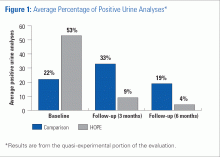Notice
NIJ has published the results of the multisite evaluation of HOPE. Learn more in the article Rigorous Multi-Site Evaluation Finds HOPE Probation Model Offers No Advantage Over Conventional Probation in Four Study Sites.
Based on the multisite evaluation, Honest Opportunity Probation with Enforcement (HOPE) has been rated "No Effects" on NIJ's CrimeSolutions.
Two evaluations of Hawaii's innovative HOPE program found that participants were significantly less likely to fail drug tests or miss probation appointments. They were also sentenced to less time in prison because of probation revocations than were those on probation who did not participate in the program.[1]
Hawaii's Opportunity Probation with Enforcement program uses a "swift and sure punishment" approach to discourage probation violations. Judges give persons on probation "warning hearings" to tell them that probation terms will be strictly enforced. Frequent, unannounced drug testing is part of the program. Participants must call a hotline each weekday morning to learn if they will be drug tested that day. Participants who fail a morning drug test are arrested immediately. They may be in court within a few hours, where the judge will change the terms of their probation to include a short stay in jail. Employed persons on probation are often permitted to serve their jail time on weekends, at least initially, to encourage continued employment.
The court also assures those who need drug treatment or mental health counseling that they will get the treatment they need and are expected to attend and complete such programs. In the past, people on probation might skip appointments with probation officers, fail numerous drug tests, or even drop out of treatment programs. Before HOPE, the consequences of these violations, such as probation revocation and a lengthy prison sentence, were typically delayed and uncertain. The HOPE approach is to respond immediately to probation violations, emphasizing swiftness and certainty rather than severity.
Researchers compared those on probation who participated in the HOPE program with those who did not. Results from the NIJ-funded quasi-experimental evaluation show that HOPE probationers had large decreases in positive drug tests and missed appointments. They were much less likely to be arrested. They spent about the same number of days in jail for probation violations as the comparison group, serving more frequent but shorter terms. However, they were sentenced to about one-third as many days in prison as the non-HOPE group for probation revocations or new convictions. A one-year randomized controlled trial confirmed these results.
During the first three months after HOPE probationers started participating, they showed striking improvement in their drug usage as positive drug tests fell from 53 percent to 9 percent, as figure 1 shows. By contrast, positive drug tests for the non-HOPE group increased initially but showed negligible change over time. Results in figure 2 from the smaller but more rigorous randomized controlled trial show similar declines in problem outcomes among persons on probation in the HOPE treatment group. HOPE was pioneered in 2004 by Circuit Judge Steven S. Alm, who believed that the probation system was not working well and could be improved. Initial participants included those whom probation officers thought were particularly high-risk.
| HOPE | Control | |
|---|---|---|
| No-shows for probation appointments | 9% | 23% |
| Positive urine tests | 13% | 46% |
| New arrest rate | 21% | 47% |
| Probation revocation rate | 7% | 15% |
| Incarceration (days sentenced) | 138 days | 267 days |
*Results are from the one-year randomized controlled trial portion of the evaluation.
About This Article
This article appeared in NIJ Journal Issue 266, June 2010.




